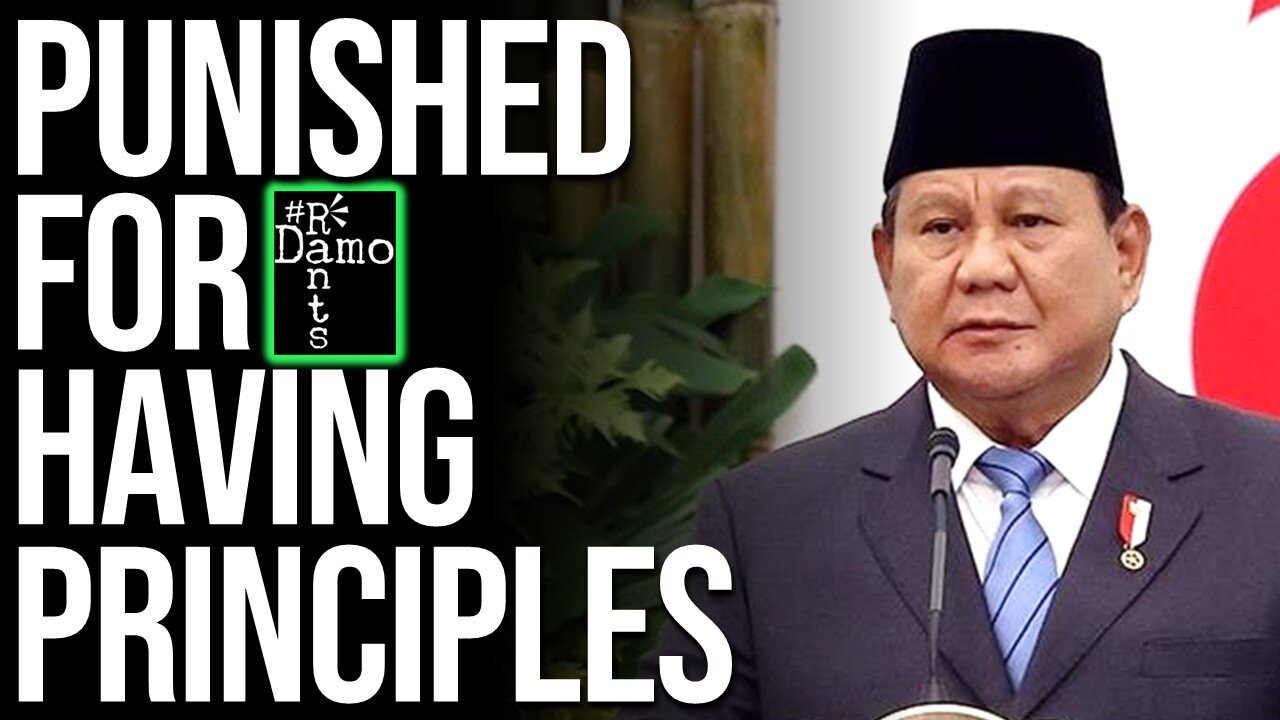Premium Only Content

Indonesia Banned – For Refusing to Bow to Israel
Right, so the International Olympic Committee says it had “no alternative solution.” That’s how it explained cutting Indonesia out of global sport for refusing to host athletes from a state on trial for genocide. No alternative, apparently, but to punish the country that still has a conscience. The IOC has ordered every federation not to stage events in Indonesia, suspended all cooperation, and frozen its 2036 Games bid — all because Jakarta refused visas for Israeli gymnasts at the World Artistic Gymnastics Championships. Indonesia said it understood the consequences. It meant it. It stood by its decision to maintain public and international order. To take a stand for that, to prove they still mean something. The IOC called that discrimination. In truth, it was sovereignty. And that’s the problem. Indonesia acted with the principle the Olympics were meant to represent in their own Charter — and the IOC has instead blinked for Israel’s sake.
Right, so when the International Olympic Committee announced that it was cutting Indonesia out of world sport. The committee told every international federation not to host events in the country, suspended cooperation with the Indonesian Olympic Committee, and froze Indonesia’s 2036 Olympic Games bid. The reason was not violence or corruption. It was a visa decision. Indonesia refused to allow Israeli gymnasts to enter the country for the World Artistic Gymnastics Championships which took place in Jakarta between 19 and 25 of this month. The IOC said it had “no alternative solution.” Those three words exposed what the organisation has now become. It was not a guardian of principle, but an enforcer of obedience in Israel’s interests. A global institution claiming neutrality had chosen to punish a sovereign state for acting on conscience during an active genocide case at the International Court of Justice. That was the point when the old assumption died—the belief that the Olympic movement still meant fairness, or that it could tell the difference between a host protecting public order and a bureaucracy protecting power.
Indonesia’s position though was unambiguous. The Youth and Sports Minister, Erick Thohir, said the government understood the consequences of its decision. He explained that the refusal was made to maintain public order and later clarified that it was also to maintain international order. The words were not evasive. They were deliberate. Indonesia’s government, aware of how the decision would be framed in Western capitals, chose to state openly that it acted within its rights and in accordance with its responsibilities. There was no mass unrest, no violence in the streets. The public order Thohir referred to was moral, not physical—the order of a society that does not accept the presence of representatives from a state accused of genocide while the evidence is still being heard in The Hague. Indonesia does not have diplomatic relations with Israel. Its position on Palestine has been consistent for decades. Netanyahu dreams of normalising ties with the country ahead of Israeli elections next year, but I fancy he will have to keep on dreaming. What the IOC called discrimination was, in fact, a continuation of national policy shaped by law, history, and public will.
But the IOC has reacted as if a crime had been committed. Its Executive Board met and declared that it could find no alternative, because God forbid they take a stand against Israel as they have against the likes of Russia and Belarus. It moved immediately to suspend cooperation, to blacklist the country from hosting future competitions, and to put its Olympic bid on hold indefinitely. This was coercion, not governance. The IOC cannot compel a state to issue visas, nobody can, this was what the Court of Arbitration for Sport found when Israel went wailing to the authorities over Indonesia’s visa refusals. Sporting bodies have no authority over immigration law. Its leverage lies in withholding prestige—the right to host, to qualify, to be seen as part of the Olympic circuit. In that sense, the sanctions against Indonesia were not an enforcement of universality; they were punishment for sovereignty. The IOC used the tools it controls to demonstrate that moral independence carries a price when it comes to Israel.
The phrase “no alternative solution” revealed the institution’s mindset. It was technically correct that the IOC had no authority to intervene in a gymnastics championship organised by an independent federation. What it did have was discretion over its own response — and that is where it made a choice. It could have limited its reaction to a statement of concern, or opened a discussion about how Olympic principles should apply when a host cites public order and sovereignty. Instead, it escalated to a blanket suspension of cooperation and a freeze on Indonesia’s 2036 bid. The claim of having no alternative was not a statement of fact. It was a statement of will — a declaration that punishment, not dialogue, was the point. Instead, it chose the path of public condemnation and total suspension. The claim of having no alternative was not an admission of helplessness. It was an admission of intent. The IOC wanted to make an example of Indonesia, to warn every other Global South state that defiance where Israel was concerned would be met with isolation.
This is not the first time the committee has claimed neutrality while enforcing politics though, thus exposing their hypocrisy. In 2022, it sanctioned Russia and Belarus for the invasion of Ukraine, restricting athletes and suspending the Russian Olympic Committee. Decades earlier, it expelled apartheid South Africa for its racially segregated teams. In both cases, it justified its actions as moral necessity. When faced with Indonesia’s refusal to host athletes from a state accused of the same structural discrimination that defined South Africa, it reversed course. The difference was not in principle but in alignment. The apartheid regime of South Africa and Russia were safe targets; sanctioning them carried no risk to the IOC’s relationships with Western governments or corporate sponsors. Indonesia, by contrast, sits in the Global South, outside those networks of power. The same act that had once been praised as moral courage became, in this case, a punishable offence.
There is no evidence that the IOC was bribed or directly pressured here. Its funding comes mainly from broadcast rights and sponsorships, not government donations. That absence makes its behaviour more revealing. It did not need to be coerced into this position. It arrived there on its own. The committee’s reflexes are shaped by the political culture of the states that dominate its structures and markets. When those states view Israel as an indispensable ally no matter what obscenities and atrocities they commit, the IOC treats Israeli access as an unquestionable right. When those states denounce another government, the IOC calls that moral clarity. The pattern is not corruption; it is cultural alignment with power. It is what happens when the rhetoric of universality is filtered through Western priorities.
Thohir’s statement about maintaining international order matters too, because it reclaims the phrase from the institutions that have used it as cover for domination. In Western usage, “rules-based order” often means compliance with Western interests. Indonesia turned that logic back on its source. By linking its visa decision to international order, it asserted that upholding the law against genocide and occupation is part of genuine order. It refused to accept that the duty to obey the IOC outweighed the duty to act in accordance with international law. The choice of wording was a signal to other states that neutrality cannot mean silence in the face of mass atrocity.
The IOC’s insistence that its own rules take precedence over state sovereignty though, exposes the limits of its authority. It cannot enforce its decisions beyond the boundaries of its prestige economy. It can recommend, it can threaten, but it cannot compel. What it can do—and what it has done—is create an environment in which obedience is the price of participation. The sanction against Indonesia operates as a warning to any other state that might refuse Israeli participation in their territories. The message is that political morality will be punished as discrimination, and that compliance is the only satisfactory form of acceptance. This is how institutions of power maintain control without direct enforcement: by converting access into leverage.
The contradiction with past Olympic actions could not be clearer. The committee that once expelled South Africa for apartheid now protects Israel, a state repeatedly accused of practising it. The body that condemned aggression in Ukraine now sanctions a state that refused complicity in aggression elsewhere. The IOC’s Charter speaks of human dignity, peace, and non-discrimination. In practice, these terms have become slogans detached from all meaning. They are invoked selectively to justify punishment or leniency as required by circumstance. The committee acts politically while claiming to stand above politics. The only consistency lies in who benefits from the inconsistency.
Indonesia’s decision was democratic and lawful. There was no breakdown of order, only the government’s anticipation of the public reaction if Israeli athletes were allowed to compete. The Indonesian public’s solidarity with Palestine is not rhetorical. It is expressed through political parties, civil society, and religious councils that all opposed the presence of Israeli teams. The visa refusal reflected that consensus. The government’s acceptance of the IOC’s sanction was an act of integrity. It chose to bear the consequences rather than betray the will of its people. The IOC, in contrast, acted without accountability to any public. It operates behind closed doors, insulated from the democratic pressures it punishes others for responding to. They could do with being told to climb down from their lofty pedestals.
The Israeli Olympic Committee welcomed the IOC’s measures, because of course they did. Western coverage of the decision framed it as necessary to preserve non-discrimination. None of these reports mentioned the scale of Israel’s own discrimination against Palestinian athletes. Over the past two decades, numerous Palestinian footballers have been detained or killed, and sports infrastructure in Gaza has been repeatedly destroyed by Israeli airstrikes. The Palestinian Olympic Committee has documented these violations. The IOC has not acted on them. The same body that claims hosts must allow unrestricted participation has tolerated a state that prevents athletes under occupation from leaving their own territory. That is not oversight. That is policy.
The IOC’s declaration that there was no alternative was a lie. It chose the path of confrontation to preserve the image of control. It acted not to defend athletes’ rights but to demonstrate power. Its decision was about discipline—enforcing the expectation that Global South nations remain venues, not actors. When a Western state takes a political stance, it is called leadership. When a Southern state does the same, it is called politicisation. This skewed and biased viewpoint is built into the structure of international sport, which operates under Western legal jurisdictions, sponsorship contracts, and media narratives. The IOC does not have to conspire with governments to serve their interests; its institutional DNA already aligns with them.
The committee’s actions also betray the athletes and fans who still believe in the Olympic ideal. The movement’s credibility depends on the perception that it stands for something more than commerce. By punishing Indonesia for acting on conscience, the IOC undermined its own claim to moral authority. It told the world that the right to host or compete is conditional on silence over Israel. It has turned its Charter into a tool of coercion. The gap between what the IOC says it is and what it does has never been wider.
The reason the committee behaves this way is fear—fear of precedent, fear of sponsors withdrawing, fear of the Global South asserting autonomy over moral questions the West believes it alone can define. Therefore the IOC’s power is symbolic. It survives on the belief that the Olympic brand embodies acceptance. If states begin to act independently of that belief, the brand loses value. Indonesia’s refusal therefore had to be punished not because it harmed athletes, but because it threatened the illusion that the IOC’s rules are uncontested. The institution reacted not as a moral body but as a corporation protecting its product.
Indonesia’s defiance shows that sovereignty still exists in places not captured by Western consensus. It also exposes how fragile the Olympic hierarchy is when confronted by principle. The IOC can bar hosts and freeze bids, but it cannot enforce legitimacy. It can stage the Games, but it cannot restore faith in its neutrality. Each selective punishment widens the recognition that the Olympic ideal has been hollowed out. What remains is a system of privilege dressed as fairness.
The pattern of responses to the IOC’s decision confirms this divide. Israeli media hailed it as justice. Western institutions stayed silent. Commentators across the Global South condemned it as hypocrisy. Several independent media outlets called this out. The Euro-Med Human Rights Monitor went further, calling for Israel to be barred from international sport for its conduct in Gaza, which should be the obvious and fair result – if it’s the right treatment for Russia and Belarus and apartheid South Africa, then it should be what happens to Israel too. These are not fringe positions. They reflect the majority view of ordinary people both in the West and the Global South. The IOC’s alignment with minority power against global conscience is unsustainable. It can manage events, but it cannot manage perception.
The Indonesian government has lived this before. It lost the U-20 football tournament for the same reason two years earlier. It learned that moral consistency carries financial cost. It also learned that such cost can be endured. The IOC’s action does not isolate Indonesia from its region or from the global South. It isolates the IOC from moral credibility. Each punishment handed down for political defiance reinforces the perception that the institution represents Western power rather than universal principle. The more the IOC insists on neutrality, the more transparently political it becomes.
When the IOC speaks of neutrality, it means compliance. When it speaks of fairness, it means obedience. When it says it has no alternative, it means it has no courage. The committee’s fear of precedent outweighs its commitment to justice. It knows that if Indonesia’s stance were accepted, others would follow. That is why it chose punishment over negotiation. It wanted to close the door on the idea that a Global South state can act on conscience without consequence.
Indonesia’s response has been steady. It has not sought to escalate. It has not withdrawn from the movement. It has accepted the penalty and maintained its position. That quiet endurance exposes the IOC’s weakness more effectively than protest could. The committee needs willing hosts; without them, its authority is theoretical. Indonesia has demonstrated that it is possible to stand outside the line of compulsion and survive. In doing so, it has revealed the IOC’s dependence on the very states it tries to discipline.
The reality is simple. A host country refused to issue visas to athletes from a state under genocide investigation. The IOC retaliated by suspending cooperation and freezing an Olympic bid. The host minister said his government understood the consequences and linked its decision to public and international order. There were no riots, no breakdown, no diplomatic collapse. There was an assertion of sovereignty. The IOC called it discrimination and mobilised its machinery of punishment. The facts require no interpretation to show what happened. The interpretation only clarifies why it matters.
The deeper meaning is that international institutions are reverting to their original function: protecting hierarchy. The IOC is an example into the global system that claims to defend rules while bending them for its allies. The committee’s decision on Indonesia is part of that structure, not separate from it. It exposes how even soft-power bodies have internalised the same divisions that define global politics. The West speaks of fairness while enforcing submission. The South acts on conscience and is told it has broken the rules. That pattern is no longer sustainable under the weight of its own contradictions.
The IOC’s behaviour has consequences beyond sport. It undermines faith in the idea that any global institution can act impartially. It teaches the public that moral language is just another form of control. It confirms that neutrality is a mask of power. The IOC still controls the Games, but it no longer commands belief. Its sanctions cannot erase the memory of who it punished here and why. Each future bid will carry the shadow of this decision. Every host will know that obedience is the condition of privilege. Every athlete will know that those Olympic rings stand for access, not equality.
Indonesia’s position will outlast the headlines. It has shown that sovereignty can still be exercised even when the price is isolation from Western institutions. The IOC’s decision will be remembered as an act of moral cowardice disguised as administrative order. The committee had alternatives. It chose coercion. It could have upheld its own Charter by balancing principle and reality. It chose to bin it and serve power instead.
For more on Indonesia’s decision to ban Israeli gymnasts and the Zionist tears it triggered, do check out this video recommendation here as your suggested next watch.
Please do also hit like, share and subscribe if you haven’t done so already so as to ensure you don’t miss out on all new daily content as well as spreading the word and helping to support the channel at the same time which is very much appreciated, holding power to account for ordinary working class people and I will hopefully catch you on the next vid. Cheers folks.
-
 LIVE
LIVE
PandaSub2000
1 day agoLIVE 10:30pm ET | NINTENDO DS Night
347 watching -
 LIVE
LIVE
Alex Zedra
3 hours agoLIVE! Battlefield RecSec
283 watching -
 1:26:50
1:26:50
The Quartering
4 hours agoErika Kirk Threatened, SNAP Riots Near, & New AstroTurfed Woke Lib Influencer
41.7K18 -
 29:24
29:24
Glenn Greenwald
6 hours agoSen. Rand Paul on Venezuela Regime Change, the New War on Drugs, MAGA Rifts, and Attacks from Trump | SYSTEM UPDATE #539
112K106 -
 1:45:39
1:45:39
Badlands Media
18 hours agoAltered State S4 Ep. 3
49.8K25 -

This is the Ray Gaming
2 hours ago $0.01 earnedRedacted Sector Day 2 | Rumble Premium Creator
14.6K4 -
 LIVE
LIVE
SOLTEKGG
4 hours ago🔴LIVE - 30 + Kill Battle Royale - BF6 Giveaway
54 watching -
![[9 WINS] Battlefield 6 BR GRIND](https://1a-1791.com/video/fww1/3b/s8/1/6/c/1/u/6c1uz.0kob-small-9-WINS-Battlefield-6-BR-GRI.jpg) LIVE
LIVE
StevieTLIVE
4 hours ago[9 WINS] Battlefield 6 BR GRIND
5 watching -
 9:38:45
9:38:45
Dr Disrespect
13 hours ago🔴LIVE - DR DISRESPECT - BATTLEFIELD 6 - REDSEC DUOS - WIN WIN WIN
118K15 -
 23:38
23:38
ArynneWexler
13 hours agoAOC vs Riley Gaines The Twitter War | NN7
17.6K7